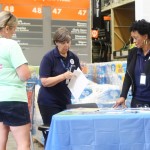RALEIGH, N.C. – North Carolina residents who suffered losses and damage as a result of Hurricane Matthew can get information about federal assistance at a disaster recovery center opening Sunday in Wilson County.
Location: DaVita Dialysis Center (Old Location)
2693 Forest Hills Rd.
Wilson, N.C. 27893
Hours: Sundays, noon to 5 p.m. (until further notice)
Monday – Saturday, 9 a.m. to 7 p.m.
Disaster recovery centers are staffed with representatives from FEMA, North Carolina Emergency Management and the U.S. Small Business Administration. Survivors can get help applying for federal assistance, learn about the types of assistance available, learn about the appeals process and get updates about applications.
Disaster survivors may register the following ways:
- Online at DisasterAssistance.gov
- Call the FEMA Helpline at 800-621-3362 (FEMA). Applicants who use 711 or Video Relay Service may also call 800-621-3362. Persons who are deaf, hard of hearing or have a speech disability and use a TTY may call 800-462-7585.
- Survivors requiring a reasonable accommodation (American Sign Language interpreting, Braille large print, etc.) while visiting a recovery center may call the appropriate Helpline number for support. The toll-free numbers are open from 7 a.m. to 11 p.m., seven days a week. Help is available in most languages, and information on the registration process is available in ASL at http://www.fema.gov/media-library/assets/videos/111546
FEMA grants do not have to be repaid. FEMA assistance is nontaxable and will not affect eligibility for Social Security, Medicaid or other federal benefits.
Survivors should register even if they have insurance. FEMA cannot duplicate insurance payments, but underinsured applicants may receive help after their claims have been settled.
For more information on the North Carolina recovery, visit the disaster webpage at fema.gov/disaster/4285; or visit the North Carolina Emergency Management website at ncdps.gov/. Follow FEMA on Twitter at @femaregion4.
###
Disaster recovery assistance is available without regard to race, color, religion, nationality, sex, age, disability, English proficiency or economic status. If you or someone you know has been discriminated against, call FEMA toll-free at 800-621-3362 or TTY at 800-462-7585.
FEMA’s mission is to support our citizens and first responders to ensure that as a nation we work together to build, sustain, and improve our capability to prepare for, protect against, respond to, recover from, and mitigate all hazards. Follow FEMA on twitter at @femaregion4. Download the FEMA app with tools and tips to keep you safe before, during, and after disasters.
Dial 2-1-1 to speak with a trained call specialist about questions you have regarding Hurricane Matthew; the service is free, confidential and available in any language. They can help direct you to resources. Call 5-1-1 for the latest road conditions or check the ReadyNC mobile app, which also has real-time shelter and evacuation information. For updates on Hurricane Matthew impacts and relief efforts, go to ReadyNC.org or follow N.C. Emergency Management on Twitter and Facebook. People or organizations that want to help ensure North Carolina recovers can visit NCdisasterrelief.org or text NCRecovers to 30306.
The U.S. Small Business Administration is the federal government’s primary source of money for the long-term rebuilding of disaster-damaged private property. SBA helps homeowners, renters, businesses of all sizes, and private non-profit organizations fund repairs or rebuilding efforts and cover the cost of replacing lost or disaster-damaged personal property. These disaster loans cover losses not fully compensated by insurance or other recoveries and do not duplicate benefits of other agencies or organizations. For more information, applicants may contact SBA’s Customer Service Center by calling 800-659-2955, emailing disastercustomerservice@sba.gov, or visiting SBA’s Web site at www.sba.gov/disaster. Deaf and hard-of-hearing individuals may call 800-877-8339.
Read this article –
FEMA/State Disaster Recovery Center to Open Sunday in Wilson County



